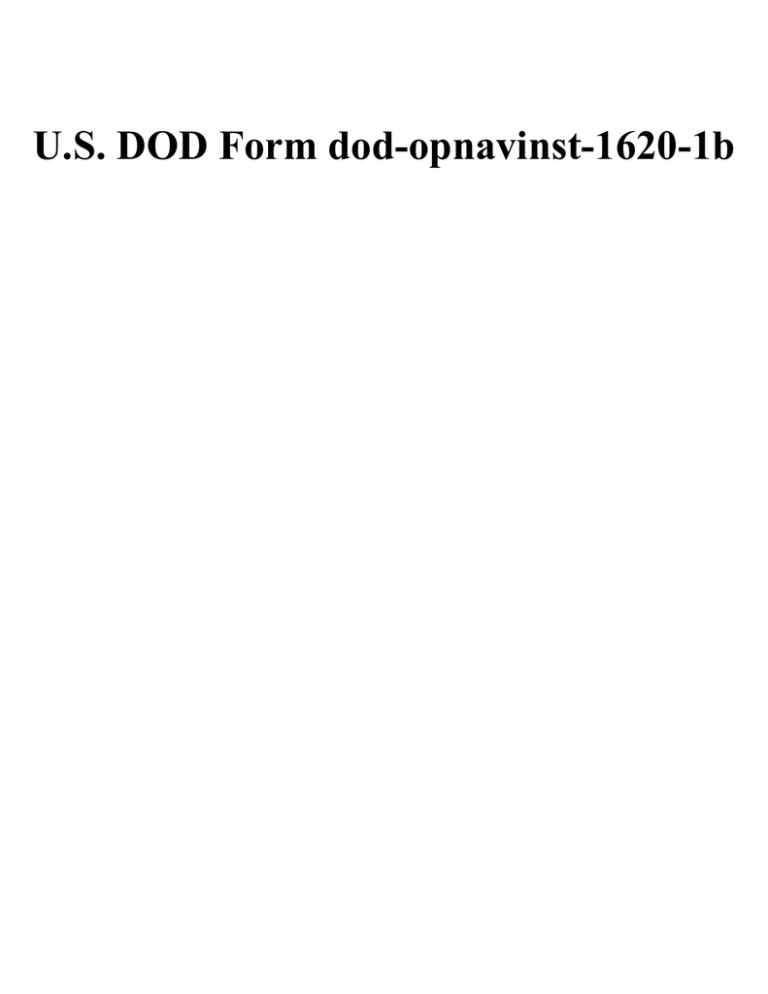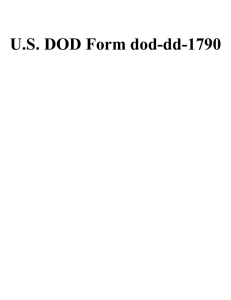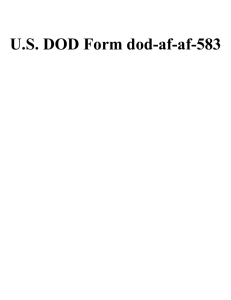U.S. DOD Form dod-opnavinst-1620-1b
advertisement

U.S. DOD Form dod-opnavinst-1620-1b o ‘#fW?+ DEPARTMENT oFFICE OF THE OF CHIEF WASHINGTON, THE OF NAVAL DC 20350.2000 NAVY OPERATIONS ,N l’!9J?J REPLY .EFE. 10 OPNAVINST 1620. lB PERS-06L 14 SEFTEMBER1999 OPNAV INSTRUCTION 1620.lB From: To: Chief of Naval Operations All Ships and Stations (less Marine Corps field addressees not having Navy personnel assigned) Subj : GUIDELINES FOR HANDLING DISSIDENT AND PROTEST ACTIVITIES AMONG MEMEERS OF THE ARMED FORCES Encl : (1) DoD Directive 1325.6 Purpose. compliance. 1. 2. To transmit enclosure Cancellation. (1) for information and OPNAVINST 1620.lA. 3. Changes. References to “servicemen Organizations” and to “Responsibilities” of the Under Secretary of Defense and of the Secretaries of the Military Departments were added to enclosure (1) by the Deputy Secretary of Defense. Enclosure (1) has been revised substantially and should be reviewed in its entirety. 4. Action. The provisions of this instruction shall be implemented by commanding officers, as appropriate. C&2?? D. T. OLIVER Vice Admiral, U.S. Navy Deputy Chief of Naval Operations (Manpower and Persomel) Distribution: SNDL Parts 1 and 2 Department of Defense DIRECTIVE OPNAVINST 1620. 14 1S3 SEP 1999 NUMBER 1325,6 October 1, 1996 USD(P&R) SUBJECT: Guidelines forHandlingDissident and Protest Activities Among Members of the Armed Forces References: (a) DoD Directive 1325.6, subject as above, September 12, 1969 (hereby canceled) (b) Chapter 47 of title 10, United States Code, “Uniform Code of Mil;tary Justice” (c) Title 18, United States Code (d) DoD Directive 1334.1, “Wearing of the Uniform,” August 1, 969 (e) Title 10, United States Code 1. REISSUANCE AND PURPOSE This Directive reissues reference (a) to update DoD policy and responsibilities governing the handling of dissident activities by members of the Army, Naw, Air Force, and Marine Corps. Specific problems should be resolved only on the basis of the particular facts of the situation and in accordance with the provisions of applicable DoD regulations and reference (b). 2. APPLICABILITY This Directive applies to the Office of the Secretary of Defense, the Military Departments (including the Coast Guard when it is operating as a Military Service in the Navy), the Chairman of the Joint Chiefs of Staff, the Combatant Commands, the Defense Agencies, and the DoD Field Activities (hereafier referred to collectively as “the DoD Components”). The term ““Military Services,” as used herein, refers to the -y, the Navy, the Air Force, and the Marine Corps. Enclosure .~ _ (1) DDDD 1325.6. OC1. 1,96 3. POLICY It is DoD policy that: 3.1. The Department of Defense shall safeguard the security of the United States. 32. The Service members’ right of expression should be preserved to the maximum extent possible, consistent with good order and discipline and the national security. 3.3. No commander should be indifferent to conduct that, ifallowed unchecked, would destroy the effectiveness of his or her unit. to proceed 3.4. The proper balancing of these interests will depend largely upon the calm and prudent judgment of the responsible commander. 3.5. The following guidelines be applied to principal activities that the Armed Forces have encountered: 3.S. 1. Possession and Distribution of Printed Materials 3.5.1.1. A commander is not authorized to prohibit the distribution of a specific issue ofa publication distributed through official outlets such as post exchanges and military libraries. In the case of distribution of publications through other than official outlets, commanders may require that prior approval be obtained for any distribution on a military installation to determine whether there is a clear danger to the loyalty, discipline, or morale of military personnel, or if the distribution of the publication would materially interfere with the accomplishment ofa military mission. Distribution of any publication determined to be a danger in any of these areas shall be prohibited. 3.5.1.2. While the mere possession of unauthorized printed material may not be prohibited, printed material that is prohibited from distribution shall be impounded if the commander determines that an attempt will be made to distribute. 3.5.1.3. The fact that a publication is critical of government policies or officials is not, in itselfi a ground on which distribution may be prohibited. Commanders have the authority to place 3.5.2. Off-Post Gathering Places. establishments “off-limits” in accordance with established procedures when, for example, the activities taking place there include counseling members to refuse to DODD 1325.6, Ocf.1.96 perform duty or to desert; pose a significant adverse effect on Service members’ health, morale, or welfare; or otherwise present a clear danger to the loyalty, discipline, or morale of a member or military unit. Commanders are not authorized to 3.5.3. Servicemen Organizations. recognize or to bargain with any union representing or seeking recognition to represent Service members. Personal writing for 3.5.4. Publication of ’’Underwound Newsparrers.” publication may not be pursued during duty hours, or accomplished by the use of Government or rrorr-appropriated fired property on- or off-duty. While publication of “underground newspapers” by military personnel off-post, on their own time, and with their own money and equipment, is not prohibited, if such a publication contains language the utterance of which is punishable under Federal law, those involved in the printing, publication, or distribution may be disciplined for such infractions. 3.5.5. On-Post Demonstrations and Similar Activities. The commander of a military installation or other military controlled facility under the jurisdiction of the United States shall prohibit any demonstration or activity on the installation or facility that could result in interference with or prevention of orderly accomplishment of the mission of the installation or facility, or present a clear danger to loyalty, discipline, or morale of the troops. It is a crime for any person to enter a military reservation for any purpose prohibited by law or lawful regulations, or for any person to enter or re-enter an installation atler having been barred by order of the commander under 18 U.S.C. 1382 (reference (c)). 3.5.6. Off-Post Demonstrations by Members. Members of [he Armed Forces are prohibited from participating in off-post demonstrations when they are on-duty, in a foreign country, when their activities constitute a breach of law and order, when violence is likely to result, or when they are in uniform in violation of DoD Directive 1334.1 (reference (d)). 3.5.7. Grievances. The right of members to complain and request redress of grievances against actions of their commanders is protected by Article 138 of the Unifomr Code of Military Justice (reference b). In addition, a member may petition or present any grievance to any Member of Congress or an Inspector General under 10 U.S.C. 1034 (reference (e)). An open door policy for complaints is a basic principle of good leadership, and commanders should personally ensure that adequate procedures exist for identifying valid complaints and taking corrective action.


